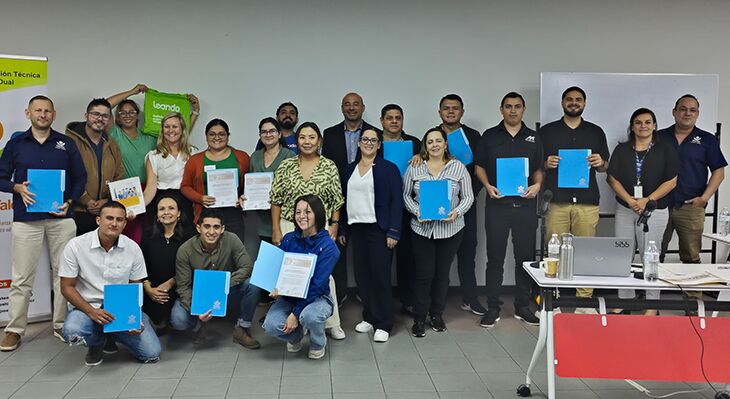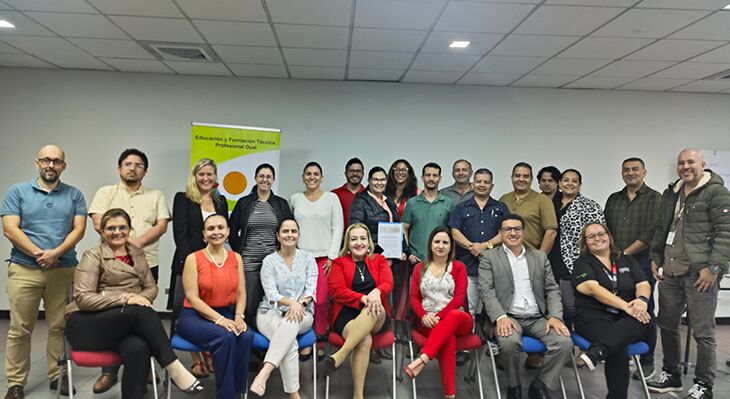Workshops for vocational training staff in Costa Rica – Qualification of in-company training staff
In 2025, GOVET launched a series of qualification courses for in-vocational training staff in Costa Rica. The focus is on role clarification, action-oriented didactics, communication, motivation, conflict management, interculturality and inclusion – tailored to the practical conditions of dual vocational training in Costa Rica.

The National Vocational Training Commission of Costa Rica (Comisión Asesora y Promotora de la EFTP Dual, CAP) has set up a vocational training qualification programme for trainers and other vocational training staff in dual vocational training in Costa Rica in cooperation with GOVET at the Federal Institute for Vocational Education and Training (BIBB) and the Federal Ministry of Education, Family, Senior Citizens, Women and Youth (BMBFSFJ), has set up a multisectional qualification series for trainers and other vocational training personnel in dual vocational training in Costa Rica. The aim is to strengthen the pedagogical and organisational role of those responsible for training in companies and to further improve the quality of learning processes in companies.
The two workshops, hosted by Isabelle Schlender (Division 2.5 Vocational Training Personnel) and Julia Olesen (Division 3.4 GOVET), were attended by nearly 50 participants from various companies and institutions.
It is particularly noteworthy that trainers in Costa Rica face exactly the same everyday challenges as vocational training staff in Germany: much has to do with communication, understanding of roles or conflicts – and less with purely professional or technical expertise.
Isabelle Schlender - Division 2.5 Vocational Training Personnel
The content – practical and directly applicable:

1. Role clarification: mentor, specialist, supervisor – all at once
- A concise introduction highlighted the diversity of roles: mentors fulfil several roles simultaneously. The functions – learning support, supervisory role, educator, colleague and qualified specialist – were analysed together. The aim was to identify role conflicts, formulate clear expectations and set priorities in everyday training.
2. Action-oriented training: the complete action model
- The training is structured in six steps – informing, planning, deciding, executing, checking/monitoring, evaluating: the complete action competence model. Workshop participants learned to develop appropriate work and learning tasks that guide learners step by step towards independent work – supported by checklists and guidelines.
3. Communication and feedback rounds that get the message across
- Based on a straightforward communication model, clear, consistent feedback was practised, and ‘sandwich feedback’ was used in group work. Result: feedback is communicated in a concrete, appreciative and effective manner.
4. Motivation and Generation Z
- What drives young people? Motivational factors were identified in short analyses and case studies; key ‘motivational impulses’ are meaning, team spirit, recognition and clear goals. The participating vocational training staff applied these factors to their own fields of work – from onboarding to project work.
5. Resolving conflicts – in a structured and fair manner
- Whether unclear instructions, under-/overwork or disrupted processes: conflicts can be seen as learning opportunities. The participants discussed helpful conflict resolution steps (clarify the problem – find the causes – develop solutions – review agreements) and creating the necessary framework conditions (time, calm, confidentiality).
6. Interculturality and sustainability in training
- Teams are diverse – accordingly, intercultural skills (including empathy, respect and open communication) were discussed. In addition, participants were introduced to ‘VET Chain’, a practical tool that brings sustainability to life along value chains.
7. Better integration of learning locations: cooperation between learning locations
- How can cooperation between companies and vocational schools be successful? The presentation recommends a three-step approach – exchanging information, planning training together, working closely together on implementation – and shows how joint projects and further training strengthen understanding across learning locations.
8. Individual support
- Mentors sharpen the eye for special support needs – from language barriers to learning difficulties to family care responsibilities – and derive appropriate educational, communicative, social and organisational support strategies.
The BIBB provides accompanying materials and checklists. Of particular note is a version of the Leando guide for training specialists that has been adapted to the circumstances in Costa Rica, facilitating its transfer into everyday business life.
With the expert knowledge of the Leando team and the materials on the platform, such as the guide for training specialists, we were able to provide our Costa Rican partners with valuable tools."
Julia Olesen - Division 3.4. GOVET
The feedback from the participating companies and institutions was very positive. The practical relevance of the content, the clarification of roles and the action-oriented methods were particularly appreciated. The provision of adapted checklists and guides – including those from the Leando portfolio – facilitates direct transfer into everyday business practice.
The technical management and hosting of the event was handled by Julia Olesen (GOVET at BIBB), Isabelle Schlender (BIBB) and Peter Rechmann (GOVET at BIBB) as part of the German-Costa Rican cooperation to strengthen training personnel.